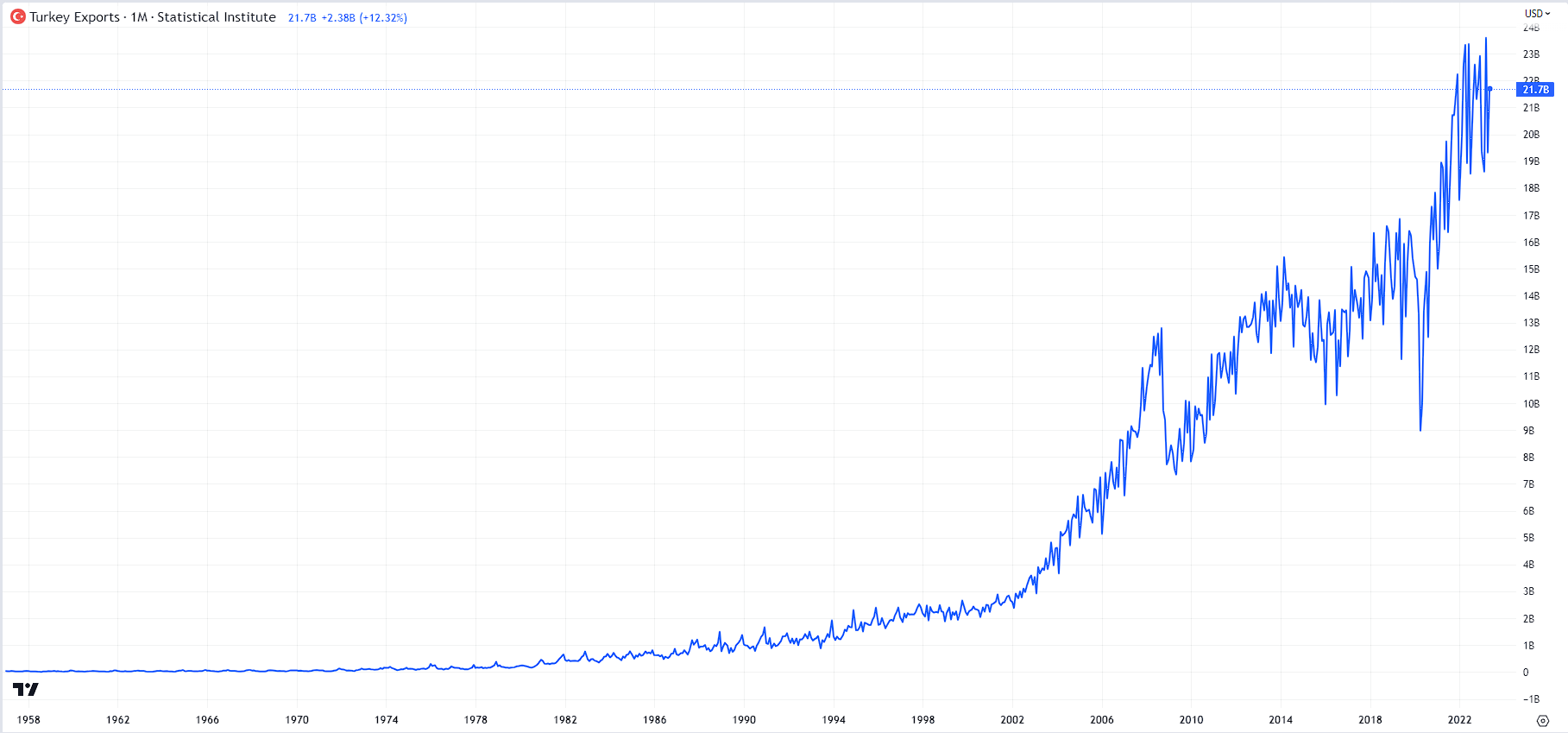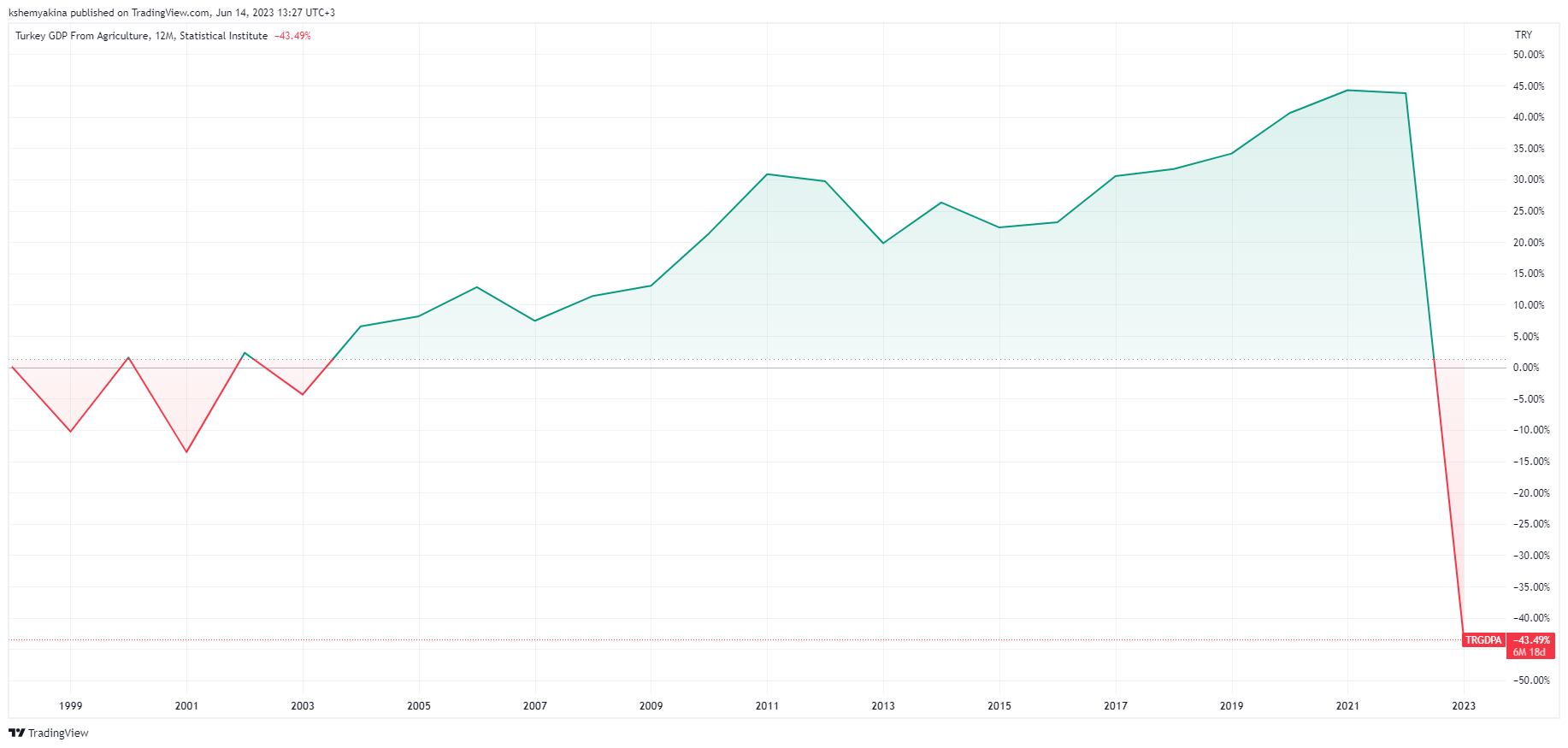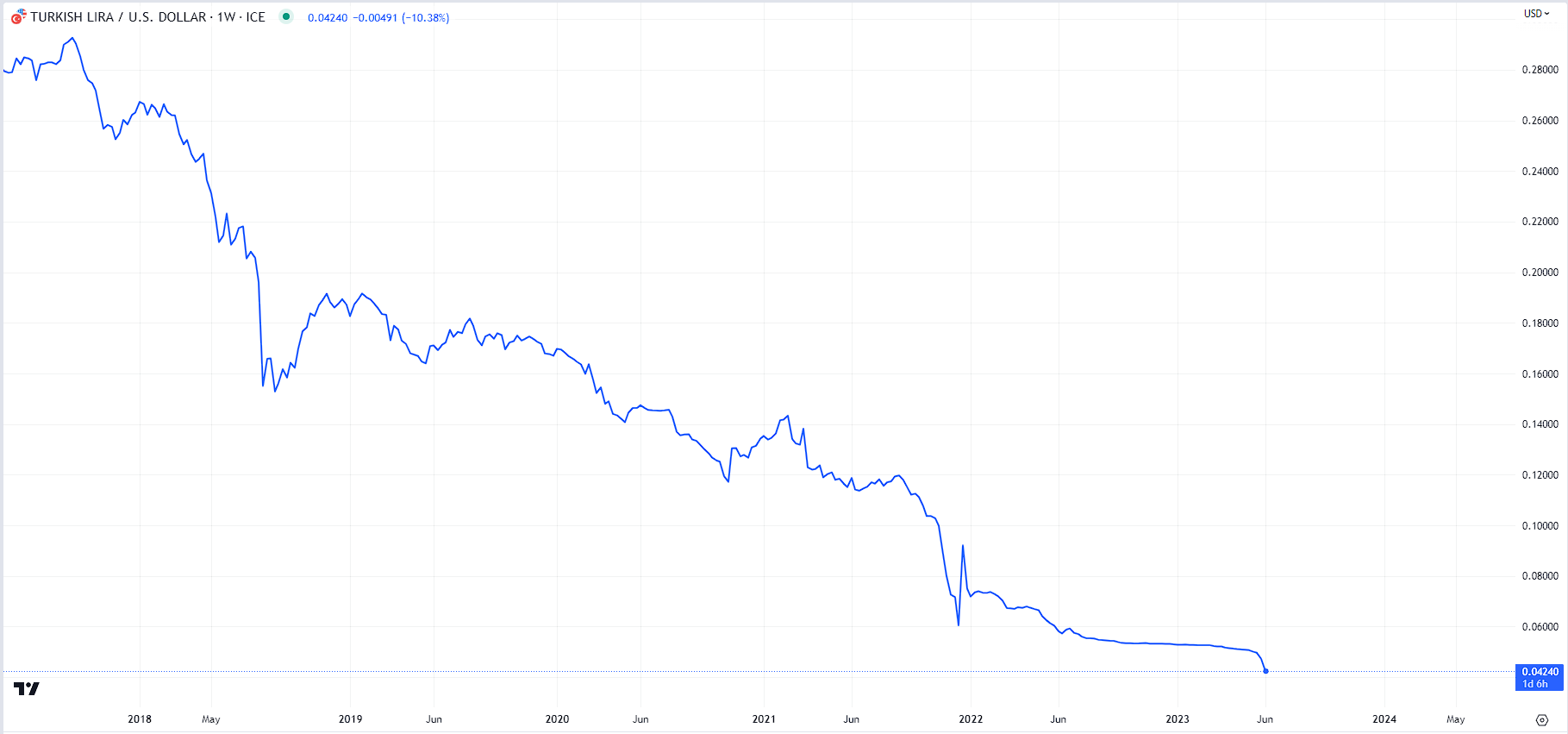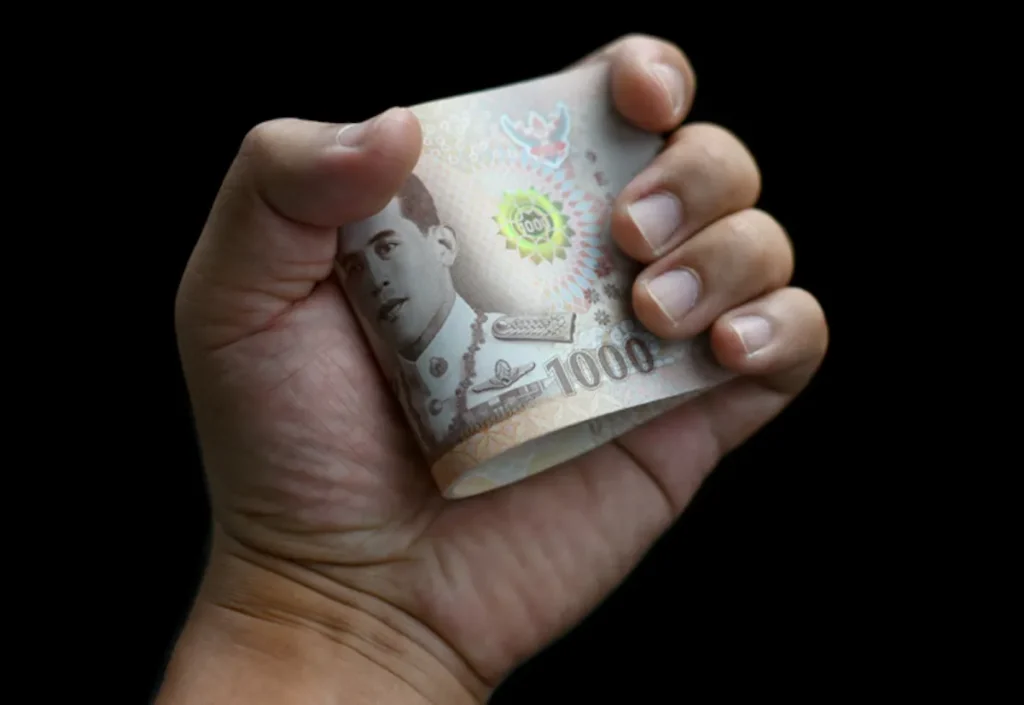Politics
In-depth Exploration of Turkey’s Economy
Turkey is a tempting place — abundant with valuable natural resources, plentiful commodities, and boasting a robust export profile. It is one of the largest economies in the Middle East and North Africa region. However, it had a significant decline due to recent presidential elections, resulting in Recep Tayyip Erdoğan securing a third term in office.
While the whole world was closely watching the elections in Turkey, reading all kinds of media, traders and investors’ main source of information was the economic calendar, containing the main updates on major global affairs affecting the market. But before making predictions, let’s analyze what Turkey’s economy is made of.
Tourism plays a vital role in the Turkish economy. In 2022, the country welcomed over 35 million tourists, accounting for approximately a quarter of the total European tourist influx.
Turkey’s industrial and service sectors are also progressing, centered around major industrial hubs like Istanbul, Ankara, and Izmir. Another significant component of the country’s economy is exports, encompassing textiles, clothing, electronics, chemicals, and other goods. As of May 2023, Turkey’s export figures stood at around $21.7 billion.

The Turkish economy places significant importance on agriculture. Despite the fact that at the start of 2023 indicators reached a nearly all-time low, Turkey still leads in tomato and pistachio production globally and actively exports vegetables, fruits, grains, and meat.

One notable development is the 8.3% increase in fees for ships passing through the straits, as Turkey aims to benefit from geopolitical circumstances related to trade growth and anti-Russian sanctions. This will allow Turkey to earn about $900 million, compared to the previous-year $160 million. Nevertheless, this seems to be insufficient for saving the Turkish Lira, which has reached a new all-time low.

Analysts highlight the reluctance of banks to intervene in currency matters as a key reason for the currency’s weakness, possibly indicating a forthcoming shift in monetary policy. The appointment of Mehmet Shimshek, a former Merrill Lynch strategist, as the finance minister and head of treasury under the new administration, has sparked hope for a return to more conventional economic policies.
Post-election, President Erdoğan has prioritized addressing the high cost of living, exorbitant prices, and reducing inflation to single digits. Officially, the inflation rate is estimated at nearly 40% per year, while unofficial sources claim it exceeds 100% per year.
Rising energy prices pose another challenge for Turkey, leading to increased production costs and higher prices for goods and services.
Nevertheless, Turkey achieved a major milestone in 2023 by signing a free trade agreement with the European Union. This allows Turkey to expand the export of its goods and services to the European market, potentially boosting income and economic growth.
Despite these efforts, Turkey’s economy still faces challenges like high unemployment rates and low incomes. The government is actively working on solutions, including job creation and income augmentation for the population.
The country continues to prioritize the development of its tourism industry, aiming to attract a record-breaking 40 million tourists in 2023. Additionally, Turkey is making strides in e-commerce, positioning itself as a global player in the market by 2024. However, the full recovery of the Turkish economy will require time and effort on the part of the government and business.
SEE ALSO: Thailand’s May 14th Election Could Be Annulled, As Parties Fight Over Parliament President

Politics
Millennials in Canada Have Turned their Backs on Justin Trudeau

Justine Trudeau and his Liberal Party are currently engaged in a fierce battle for second place against Jagmeet Singh’s socialist NDP, as both parties find themselves trailing by 20 points behind Pierre Poilievre’s Conservatives.
A recent poll indicates that 38% of Canadians consider Trudeau to be the most ineffective leader the nation has encountered in over fifty years. An impressive 47% of Canadian Millennials indicated they would support Poilievre if an election were to take place today, while nearly half of all Canadians express a desire for an election to be called this year.
Pierre Poilievre’s strong appeal among young voters can be attributed primarily to economic factors: soaring inflation, a pressing cost-of-living crisis, and the challenge of housing affordability are pushing many away from the Liberals, who have held power for nearly nine years.
According to UnHeard, Millennials are increasingly distancing themselves from Trudeau due to his stringent measures aimed at controlling the internet to combat alleged disinformation, as well as his climate change initiatives, notably the carbon tax.

Protest in downtown Toronto against mass immigration on Canada Day – TNC Image
An increasing number of Canadians are becoming aware of Trudeau’s ineffective policies and his approach to mass immigration. This past summer, there was significant outrage among parents of teenagers and young adults as they observed their children remaining at home without jobs.
The primary concern stemmed from the fact that most low-skilled and entry-level positions were being filled by unskilled, temporary foreign workers, predominantly from India.
There has been a notable rise in criminal activities linked to international students and unvetted temporary residents who are becoming involved with Punjabi gangs in Canada, contributing to a surge in auto thefts nationwide.
Pierre Poilievre and the Conservatives are actively seeking to alter Trudeau’s approach to mass immigration and prioritize the construction of more housing should they come into power.
Significantly, Pierre Poilievre is perceived as more trustworthy than Trudeau, with over half of Canadians characterizing Poilievre as “open and honest about his actions, decisions, and intentions,” while only 39% share that sentiment regarding Trudeau.
The characteristics in question may shed light on Poilievre’s favorable polling, particularly among younger voters and women, who have historically leaned towards the Liberals or the NDP rather than the Conservatives.
The Liberal Party’s support has dwindled to an estimated 7% of Canadians, revealing a significant number of disillusioned voters eager for transformation. Poilievre is emerging as the type of leader that resonates with the desires of many Canadians.
Related News:
Trudeau Now Using Abortion Scare Tactics to Recapture Voters
Trudeau Now Using Abortion Scare Tactics to Recapture Voters
Politics
U.N. Special Rapporteur Calls on Thailand’s Banks to Cut-Off Myanmar Junta

The U.N special rapporteur for human rights in Myanmar has said the Bank of Thailand, commercial banks, and the anti-money laundering office are working on measures to stop the Myanmar Junta from acquiring weapons through Thailand’s banking system.
Tom Andrews the U.N. special rapporteur for human rights in Myanmar, said that some banks commercial in Thailand had aided Myanmar Junta’s by facilitating transactions that supplied military equipment to the Junta through the international banking system.
He called on the Bank of Thailand and financial institutions to do more to stop Myanmar’s junta acquiring weapons which they use on civilians to maintain power.
The special rapporteur was in Bangkok to address a parliamentary committee on security, he called on the Thai government to stop financial transactions that help supply weapons to Myanmar’s junta in line with a plan promoted by the Association of Southeast Asian Nations (ASEAN) that sets out an end to violence as a first step toward peace.
In his 2023 report “The Billion Dollar Death Trade,” Andrews noted that Singapore had implemented a clear policy opposing the transfer of weapons to Myanmar.

Thai Baht – File Image
Thailand’s Banks Lacked Clear Policy
As a result, exports of weapons and related materials from Singapore-registered entities using the formal banking system dropped from almost U.S. $120 million in fiscal year 2022 to just over $10 million over the next 12 months.
However, he said Thailand had no explicit policy position opposing weapons transfer to the Myanmar Junta, which saw exports from Thai-registered entities more than double in 2023, from just over $60 million to nearly $130 million.
He called on Thai Government to conduct a thorough investigation into transfers as Singapore had done into its companies’ dealings.
Andrews told the the committee that five Thai commercial banks and Thai-based companies were assisting Myanmar’s junta obtain weapons, dual-technology items and jet fuel, enabling Military Junta to conduct atrocities against the people.
But said he had found no evidence that the Thai government was involved or was aware of the transactions or that Thai commercial banks had knowledge.

Photo courtesy of The Nation
Banks Condemn Myanmar Junta Violence
Meanwhile representatives from Thailand’s central bank, anti-money laundering office and the commercial banks named in the report were also present at the parliamentary meeting at government house in Bangkok.
A representative of the Bank of Thailand said officials were working with the commercial banks and the anti-money laundering office to make sure that enhanced oversight was properly practiced.
The Thai Bankers Association that was also at the parliamentary meeting said it did not have the means to investigate and monitor such irregularities beyond Thailand’s borders.
Mr. Pongsit Chaichatpornsuk, a Thai Bankers Association representative told the committee that If government security agencies tell us, we will stop transactions. We don’t support arms procurement by Myanmar Junta or any military government to violate human rights.
Thailand, which shares a long border with Myanmar and hosts many thousands of refugees fleeing conflict there, has tried to promote dialogue between Myanmar’s military rulers and opposition forces but no progress has been made.
This Article was first published in RFA
Politics
People Rushing Sign Online Petition to Impeach South Korea’s President Crash Site

The Speaker of the National Assembly of South Korea said in a statement that an online petition calling for South Korea’s President Mr. Yoon Suk-yeol’s impeachment crashed due to the enormous number of individuals attempting to sign the petition. Saying the National Assembly would resolve the matter as quickly as possible.
Since the petition was launch on the National Assembly’s website on June 20, more than 811,000 people have signed it. The petition urges Parliament to introduce legislation to impeach President Yoon on the grounds that he is unfit for office.
Late on June 30, National Assembly Speaker Mr. Woo Won-shik issued an apology for the disturbance and stated that Parliament would take action to protect the public’s fundamental rights.
People attempting to access the petition on July 1 experienced delays of up to four hours. At one point, an error message indicated that more than 30,000 individuals were waiting to access the site.
South Korea’s Parliament Hesitant
The online petition accuses Yoon of corruption, escalating the risk of conflict with North Korea, and endangering South Koreans’ health by failing to prevent Japan from leaking treated radioactive water from the destroyed Fukushima nuclear power plant.
By law, Parliament must assign every petition signed by more than 50,000 people to a committee, which will then decide whether to put it to a vote in the assembly.
However, the opposition Democratic Party, which has a majority in Parliament, is hesitant to turn the petition into an impeachment bill, according to media reports, with a spokesperson stating that the party has yet to address the topic.
The Parliament can impeach a president with a two-thirds majority. The Constitutional Court then deliberates the motion and decides whether to remove or reinstall the president.
Meanwhile, on Monday Reuters reported North Korea criticized a joint military exercise performed this month by South Korea, Japan, and the United States, according to official media, saying such drills demonstrate the three nations’ alliance has evolved into “the Asian version of NATO”.
On Thursday, the three countries began large-scale combined military drills named “Freedom Edge” featuring navy destroyers, fighter fighters, and the nuclear-powered US aircraft carrier Theodore Roosevelt, with the goal of strengthening defenses against missiles, submarines, and air strikes.
The drill was designed at a three-way meeting at Camp David last year to boost military cooperation amid concerns on the Korean peninsula caused by North Korea’s weapons testing.
Pyongyang will not overlook the strengthening of a military bloc led by the United States and its allies, and it would respond aggressively and decisively to defend regional peace, according to North Korea’s foreign ministry, as reported by KCNA.
-

 News3 years ago
News3 years agoLet’s Know About Ultra High Net Worth Individual
-
Entertainment2 years ago
Mabelle Prior: The Voice of Hope, Resilience, and Diversity Inspiring Generations
-

 Health3 years ago
Health3 years agoHow Much Ivermectin Should You Take?
-

 Tech2 years ago
Tech2 years agoTop Forex Brokers of 2023: Reviews and Analysis for Successful Trading
-

 Lifestyles3 years ago
Lifestyles3 years agoAries Soulmate Signs
-

 Movies2 years ago
Movies2 years agoWhat Should I Do If Disney Plus Keeps Logging Me Out of TV?
-

 Health3 years ago
Health3 years agoCan I Buy Ivermectin Without A Prescription in the USA?
-

 Learning2 years ago
Learning2 years agoVirtual Numbers: What Are They For?